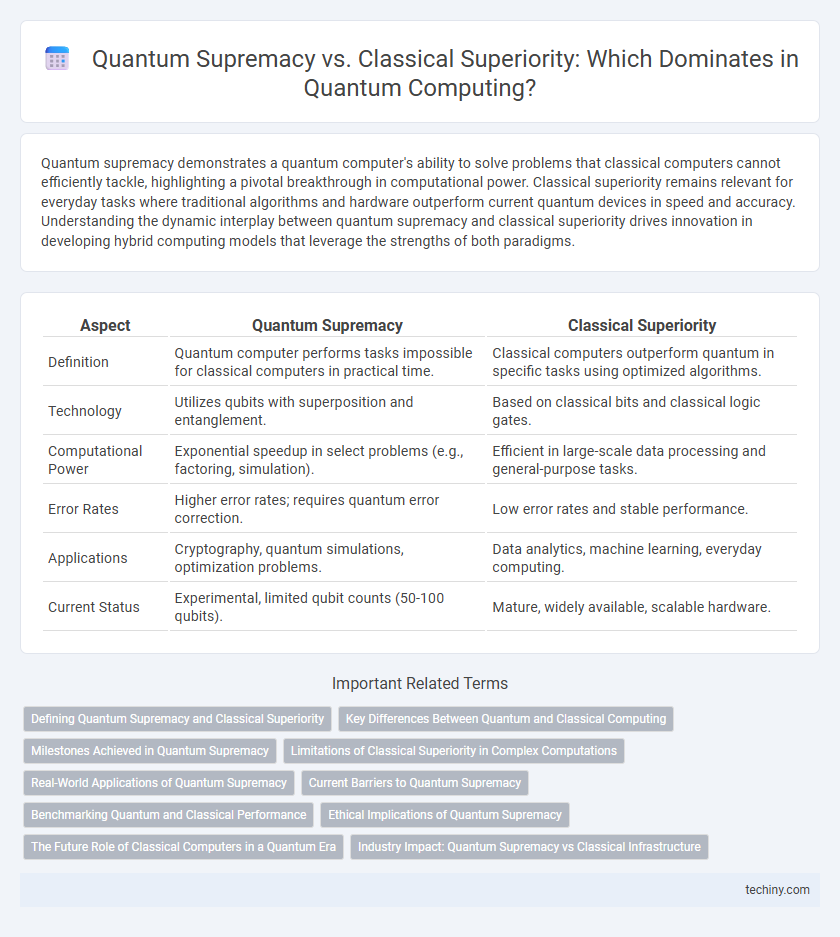Quantum supremacy demonstrates a quantum computer's ability to solve problems that classical computers cannot efficiently tackle, highlighting a pivotal breakthrough in computational power. Classical superiority remains relevant for everyday tasks where traditional algorithms and hardware outperform current quantum devices in speed and accuracy. Understanding the dynamic interplay between quantum supremacy and classical superiority drives innovation in developing hybrid computing models that leverage the strengths of both paradigms.
Table of Comparison
| Aspect | Quantum Supremacy | Classical Superiority |
|---|---|---|
| Definition | Quantum computer performs tasks impossible for classical computers in practical time. | Classical computers outperform quantum in specific tasks using optimized algorithms. |
| Technology | Utilizes qubits with superposition and entanglement. | Based on classical bits and classical logic gates. |
| Computational Power | Exponential speedup in select problems (e.g., factoring, simulation). | Efficient in large-scale data processing and general-purpose tasks. |
| Error Rates | Higher error rates; requires quantum error correction. | Low error rates and stable performance. |
| Applications | Cryptography, quantum simulations, optimization problems. | Data analytics, machine learning, everyday computing. |
| Current Status | Experimental, limited qubit counts (50-100 qubits). | Mature, widely available, scalable hardware. |
Defining Quantum Supremacy and Classical Superiority
Quantum Supremacy refers to the point at which a quantum computer performs a calculation that is infeasible for any classical supercomputer to complete within a reasonable timeframe, showcasing the unique computational power of quantum mechanics. Classical Superiority emphasizes the ongoing efficiency and reliability of classical computers for general-purpose tasks, especially where quantum error rates and coherence times remain limiting factors. Distinguishing these concepts highlights the current landscape where quantum devices outperform specific problems, while classical systems maintain dominance in broader, practical applications.
Key Differences Between Quantum and Classical Computing
Quantum computing leverages quantum bits (qubits) that utilize superposition and entanglement, enabling parallel processing of complex computations beyond classical binary bits' capabilities. Classical computing relies on deterministic, sequential logic gates manipulating bits as 0s or 1s, limiting performance for specific problems like factorization or optimization. Quantum supremacy refers to quantum computers solving tasks infeasible for classical systems, whereas classical superiority applies when traditional computers outperform noisy intermediate-scale quantum devices on practical applications.
Milestones Achieved in Quantum Supremacy
Quantum supremacy was first demonstrated in 2019 when Google's Sycamore processor solved a complex problem in 200 seconds that would take the fastest classical supercomputers approximately 10,000 years. This milestone highlighted the potential of quantum circuits to perform specific calculations that classical systems cannot efficiently replicate. Subsequent advances improved error rates and qubit coherence times, accelerating progress toward practical quantum advantage beyond niche tasks.
Limitations of Classical Superiority in Complex Computations
Classical superiority faces significant limitations in handling complex computations due to exponential scaling of resources required for simulating quantum systems. Tasks involving high-dimensional Hilbert spaces or intricate quantum entanglement rapidly exceed classical processing capabilities, leading to infeasible computation times. Quantum supremacy demonstrates the potential to solve specific problems, such as factoring large integers or simulating quantum molecules, more efficiently than any classical supercomputer.
Real-World Applications of Quantum Supremacy
Quantum supremacy demonstrates a quantum computer's ability to solve problems beyond classical computers' reach, specifically in complex simulations, cryptography, and optimization tasks. Real-world applications include accelerating drug discovery by modeling molecular interactions with unprecedented precision and enhancing cryptographic security through quantum key distribution. These breakthroughs pave the way for transformative advances in materials science, financial modeling, and artificial intelligence.
Current Barriers to Quantum Supremacy
Quantum supremacy faces significant barriers including error rates in qubit operations, limited qubit coherence times, and material defects impacting quantum gate fidelity, which hinder the execution of complex algorithms beyond classical capabilities. Scalability challenges and the lack of robust quantum error correction techniques further restrict the ability to maintain quantum advantage over classical supercomputers. Ongoing research targets improving fault-tolerant quantum computing architectures and developing qubits with longer coherence to transcend current limitations in demonstrating practical quantum supremacy.
Benchmarking Quantum and Classical Performance
Benchmarking quantum and classical performance involves comparing quantum processors' ability to solve specific problems faster than the best classical supercomputers, a milestone known as quantum supremacy. Quantum supremacy is demonstrated when a quantum computer executes tasks beyond classical capabilities within reasonable timeframes, often verified using random circuit sampling or optimization problems like boson sampling. Classical superiority, however, remains significant in many practical applications where classical algorithms and hardware continue to outperform current quantum machines, emphasizing the importance of hybrid benchmarking strategies to evaluate real-world performance gains.
Ethical Implications of Quantum Supremacy
Quantum supremacy challenges classical superiority by enabling quantum computers to solve problems beyond the reach of classical algorithms, raising significant ethical implications surrounding data security and privacy. The ability of quantum machines to break widely used encryption methods risks exposing sensitive information, necessitating the development of quantum-resistant cryptographic standards. Ethical frameworks must guide the deployment of quantum technology to prevent misuse and ensure equitable access while safeguarding societal trust.
The Future Role of Classical Computers in a Quantum Era
Classical computers will continue to play a critical role in the quantum era by handling tasks like error correction, algorithm optimization, and hybrid quantum-classical computations. While quantum supremacy marks a milestone where quantum machines outperform classical counterparts on specific problems, classical systems remain indispensable for general-purpose computing and data storage. Integrating classical and quantum technologies will drive advancements in cryptography, complex simulations, and artificial intelligence applications across various industries.
Industry Impact: Quantum Supremacy vs Classical Infrastructure
Quantum supremacy demonstrates quantum computers solving specific problems exponentially faster than classical systems, highlighting transformative potential for industries such as pharmaceuticals, cryptography, and materials science. Classical infrastructure remains dominant for general-purpose computing due to its established scalability, reliability, and cost-efficiency across most business applications. The industry impact hinges on hybrid approaches that integrate quantum acceleration with classical systems, optimizing performance while leveraging existing infrastructure investments.
Quantum Supremacy vs Classical Superiority Infographic

 techiny.com
techiny.com